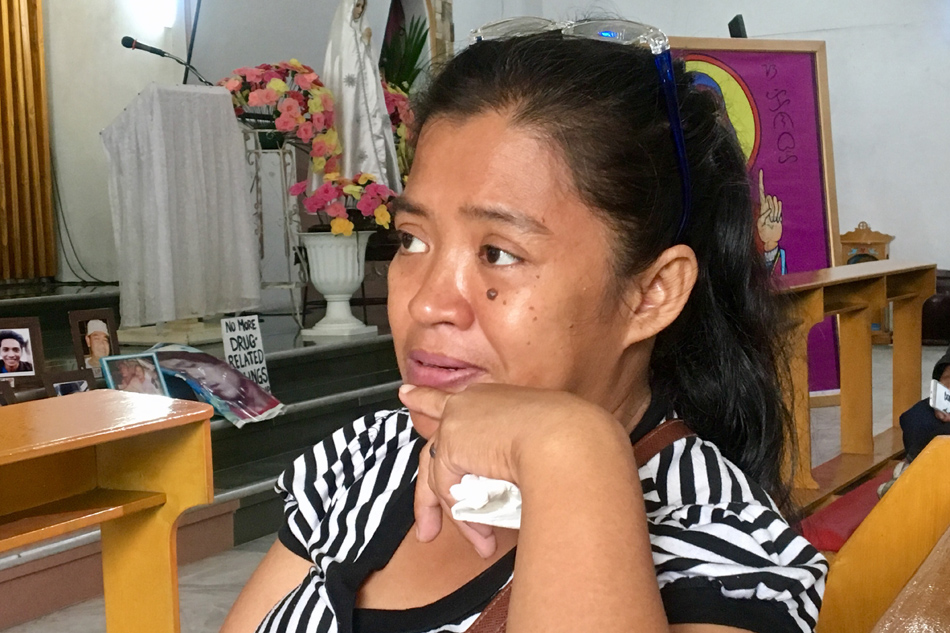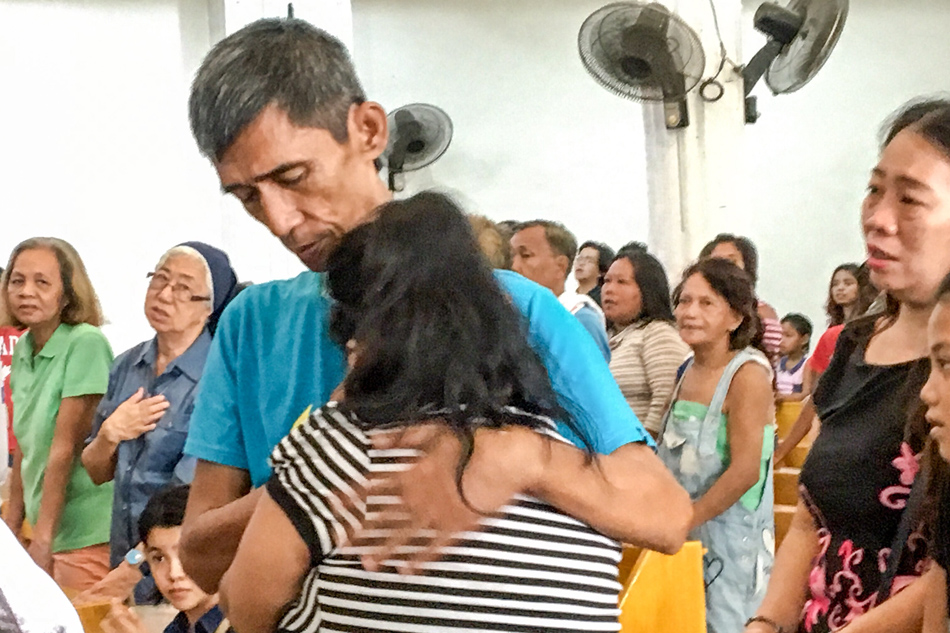Grieving mom writes poem for son slain in Duterte’s drug war | ABS-CBN
ADVERTISEMENT

Welcome, Kapamilya! We use cookies to improve your browsing experience. Continuing to use this site means you agree to our use of cookies. Tell me more!
Grieving mom writes poem for son slain in Duterte’s drug war
Inday Espina-Varona
Published Oct 31, 2017 07:43 PM PHT
“Bago pa man lang pumikit ang aking mga mata, sana mabigyan na ng hustisya ang iyong pagkamatay, akin anak.”
“Bago pa man lang pumikit ang aking mga mata, sana mabigyan na ng hustisya ang iyong pagkamatay, akin anak.”
(Before my eyes close in this life, may your killers be brought to justice, my child.)
(Before my eyes close in this life, may your killers be brought to justice, my child.)
Normita Lopez wrote an elegy to 23-year-old second son, Djastin, while listening to indigenous people share their experiences with summary executions in Mindanao.
Normita Lopez wrote an elegy to 23-year-old second son, Djastin, while listening to indigenous people share their experiences with summary executions in Mindanao.
“I was listening to them. Someone asked if I wanted to speak,” said Normita, a member of Rise Up for Life and Justice, a multi-faith group of families of drug war victims and their supporters.
“I was listening to them. Someone asked if I wanted to speak,” said Normita, a member of Rise Up for Life and Justice, a multi-faith group of families of drug war victims and their supporters.
ADVERTISEMENT
“I was suddenly filled with an urge to write a poem,” the mother of nine children told ABS-CBN News on the eve of the Philippines’ commemoration of All Saints’ Day and All Souls' Day.
“I was suddenly filled with an urge to write a poem,” the mother of nine children told ABS-CBN News on the eve of the Philippines’ commemoration of All Saints’ Day and All Souls' Day.
The occasional community theater actor wrote her first poem on her mobile phone.
The occasional community theater actor wrote her first poem on her mobile phone.
“I didn’t have pen or paper, so I used my mobile phone,” Normita said. “I didn’t like my first attempts and erased them to start anew.”
“I didn’t have pen or paper, so I used my mobile phone,” Normita said. “I didn’t like my first attempts and erased them to start anew.”
The effort took less than an hour. Normita describes the process as “a conversation with Djastin,” one of the thousands of slain victims of President Rodrigo Duterte’s drug war.
The effort took less than an hour. Normita describes the process as “a conversation with Djastin,” one of the thousands of slain victims of President Rodrigo Duterte’s drug war.
Written in Tagalog, the poem starts as every mother’s story. Normita shares her excitement at her pregnancy and joy at Djastin’s birth. She recalls the milestones of the young boy – the first smile, the first step.
Written in Tagalog, the poem starts as every mother’s story. Normita shares her excitement at her pregnancy and joy at Djastin’s birth. She recalls the milestones of the young boy – the first smile, the first step.
ADVERTISEMENT
That life ended with Duterte’s campaign to rid the country of drug dealers and addicts.
That life ended with Duterte’s campaign to rid the country of drug dealers and addicts.
“In one blink, they took my son’s life, the son I love and will never embrace again.”
“In one blink, they took my son’s life, the son I love and will never embrace again.”
“I will never see his smile again, will never hear his jokes and the laughter that filled our house.”
“I will never see his smile again, will never hear his jokes and the laughter that filled our house.”
Normita fights for her dream in the here and now. She filed criminal and administrative charges at the Ombudsman last month against two police officers involved in Djastin’s death. The National Union of People’s Lawyers (NUPL) is handling the case.
Normita fights for her dream in the here and now. She filed criminal and administrative charges at the Ombudsman last month against two police officers involved in Djastin’s death. The National Union of People’s Lawyers (NUPL) is handling the case.
LOOK: Dennise David & Normita Lopez (parents of two tokhang victims), with the assistance of the NUPL, file criminal raps vs MPD cops pic.twitter.com/zs4D3yiBVS
— Adrian Ayalin (@adrianayalin) September 28, 2017
LOOK: Dennise David & Normita Lopez (parents of two tokhang victims), with the assistance of the NUPL, file criminal raps vs MPD cops pic.twitter.com/zs4D3yiBVS
— Adrian Ayalin (@adrianayalin) September 28, 2017
Normita told ABS-CBN News that police gave contradictory reports on the operation that killed her son.
Normita told ABS-CBN News that police gave contradictory reports on the operation that killed her son.
ADVERTISEMENT
The spot report said he was killed resisting arrest during a “drug-bust” operation.
The spot report said he was killed resisting arrest during a “drug-bust” operation.
Later, the police issued another report, claiming Djastin was being arrested for the killing of another Tondo resident, Michael Turla, slain three days before him.
Later, the police issued another report, claiming Djastin was being arrested for the killing of another Tondo resident, Michael Turla, slain three days before him.
“He was an epileptic,” Normita said of her son. “He was frail. How could he be a killer?”
“He was an epileptic,” Normita said of her son. “He was frail. How could he be a killer?”
Witnesses said the police who accosted Djastin beat him up before shooting him.
Witnesses said the police who accosted Djastin beat him up before shooting him.
More than 3,900 have been killed in presumed-legitimate police operations since Duterte took power. Thousands more have been slain in what police label as “deaths under investigation.”
More than 3,900 have been killed in presumed-legitimate police operations since Duterte took power. Thousands more have been slain in what police label as “deaths under investigation.”
ADVERTISEMENT
KILLING ISN'T RIGHT
More than a hundred people, including other kin of the drug war slain and church workers, filled the San Isidro Labrador Church, in a Quezon City parish that has seen 50 residents killed in just over a year.
More than a hundred people, including other kin of the drug war slain and church workers, filled the San Isidro Labrador Church, in a Quezon City parish that has seen 50 residents killed in just over a year.
Normita’s poem was passed on from one mother to another, sending them weeping while waiting for Mass to start.
Normita’s poem was passed on from one mother to another, sending them weeping while waiting for Mass to start.
Normita broke down during the Mass as did other parents, spouses, partners and children, and the Rise Up volunteers who work daily with them.
Normita broke down during the Mass as did other parents, spouses, partners and children, and the Rise Up volunteers who work daily with them.
“At no time has killing been right,” said Carmelite Fr. Gilbert Billena, parish priest of the host community. “There is no law in this country and certainly, no law of God, that allows killings, especially of the defenseless and the innocent.
He urged other families of drug war victims to find the courage to fight back.
“At no time has killing been right,” said Carmelite Fr. Gilbert Billena, parish priest of the host community. “There is no law in this country and certainly, no law of God, that allows killings, especially of the defenseless and the innocent.
He urged other families of drug war victims to find the courage to fight back.
“Let us fight the scourge of illegal drugs, but not through killings. Rehabilitation programs, social services, employment for the poor forced into the narcotics street trade are the answers to the problem, but never killings,” Billena said.
“Let us fight the scourge of illegal drugs, but not through killings. Rehabilitation programs, social services, employment for the poor forced into the narcotics street trade are the answers to the problem, but never killings,” Billena said.
Read More:
war on drugs
normita lopez
djastin lopez
crime
homicide
blog roll
scarredcat
human rights
EJKs
police abuses
ADVERTISEMENT
ADVERTISEMENT






